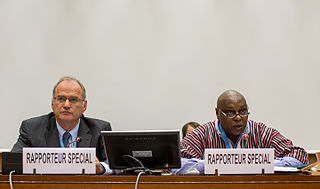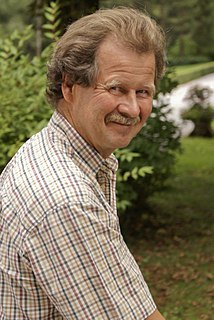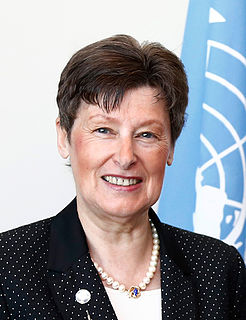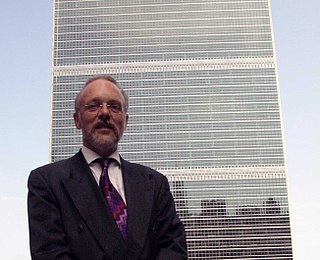Members of the WEIGD
| Name [13] | Country | Since [14] |
|---|---|---|
| Mr. Bernard Duhaime | 2014 | |
| Mr. Tae-Ung Baik | 2015 | |
| Ms Houria Es-Slami | 2014 | |
| Mr. Henrikas Mickevičius | 2015 | |
| Mr. Luciano A. Hazan | 2017 |
The Working Group Against Enforced and Involuntary Disappearance has been set up to investigate cases in which persons are detained or killed by states in secret prisons and the corpses are disposed of so that nothing can be proven to them.
The UN Human Rights Commission created this body on February 29, 1980 by means of a resolution, [1] which also defined the mandate. This UN mandate is limited to three years and is regularly renewed. After the UN Human Rights Commission was replaced in 2006 by the UN Human Rights Council, [2] [3] it is now in charge and exercising oversight. The last extension of the mandate took place on October 6, 2020.
The members of the working group are not United Nations staff but are mandated by the UN [4] [5] and the UN Human Rights Council has adopted a code of conduct. [6] The independent status of elected representatives is crucial for the impartial performance of their duties. [7] The term of office of a mandate is limited to a maximum of six years. [8]
The working group prepares thematic studies and develops guidelines for the improvement of human rights. She makes country visits [9] and can make recommendations in an advisory capacity. [10] Its tasks include examining communications [11] and proposing to States how to remedy any abuses. It also makes follow-up procedures, [12] in which it reviews the implementation of the recommendations. To this end, it draws up annual reports to the attention of the UN Human Rights Council and the UN General Assembly.
| Name [13] | Country | Since [14] |
|---|---|---|
| Mr. Bernard Duhaime | 2014 | |
| Mr. Tae-Ung Baik | 2015 | |
| Ms Houria Es-Slami | 2014 | |
| Mr. Henrikas Mickevičius | 2015 | |
| Mr. Luciano A. Hazan | 2017 |
Refer to the International Convention for the Protection of All Persons from Enforced Disappearance.

The United Nations Interim Administration Mission in Kosovo (UNMIK) is the officially mandated mission of the United Nations in Kosovo. The UNMIK describes its mandate as being to "help the United Nations Security Council achieve an overall objective, namely, to ensure conditions for a peaceful and normal life for all inhabitants of Kosovo and advance regional stability in the western Balkans."
The United Nations Commission on Human Rights (UNCHR) was a functional commission within the overall framework of the United Nations from 1946 until it was replaced by the United Nations Human Rights Council in 2006. It was a subsidiary body of the UN Economic and Social Council (ECOSOC), and was also assisted in its work by the Office of the United Nations High Commissioner for Human Rights (UNOHCHR). It was the UN's principal mechanism and international forum concerned with the promotion and protection of human rights.

The United Nations Human Rights Council (UNHRC) is a United Nations body whose mission is to promote and protect human rights around the world. The Council has 47 members elected for staggered three-year terms on a regional group basis. The headquarters of the Council is in Geneva, Switzerland.

A forced disappearance is the secret abduction or imprisonment of a person by a state or political organization, or by a third party with the authorization, support, or acquiescence of a state or political organization, followed by a refusal to acknowledge the person's fate and whereabouts, with the intent of placing the victim outside the protection of the law.

Special rapporteur, independent expert, and working group member are titles given to individuals working on behalf of the United Nations (UN) within the scope of "special procedure" mechanisms who have a specific country or thematic mandate from the United Nations Human Rights Council. The term "rapporteur" is a French-derived word for an investigator who reports to a deliberative body.
The International Day of the Disappeared, on August 30 of each year, is a day created to draw attention to the fate of individuals imprisoned at places and under poor conditions unknown to their relatives and/or legal representatives. The impulse for the day came from the Latin American Federation of Associations for Relatives of Detained-Disappeared (Federación Latinoamericana de Asociaciones de Familiares de Detenidos-Desaparecidos, or FEDEFAM), a non-governmental organization founded in 1981 in Costa Rica as an association of local and regional groups actively working against secret imprisonment, forced disappearances and abduction in a number of Latin-American countries.
The Equity and Reconciliation Commission is a Moroccan human rights and truth commission created on January 7, 2004 when King Mohammed VI signed a Dahir. This truth commission was established to reconcile victims of human rights abuses, such as torture, forced disappearances and arbitrary arrests, committed by Makhzen during the Years of lead, with the State. It covers 1956 to 1999, spanning the reign of the two previous monarchs. The proclaimed objectives of the commission were the protection and the promotion of the human rights in Morocco.

Manfred Nowak is an Austrian human rights lawyer, who served as the United Nations Special Rapporteur on Torture from 2004 to 2010. He is Secretary General of the European Inter-University Center for Human Rights and Democratisation (EIUC) in Venice, Italy; Professor of International Human Rights and Scientific Director of the Vienna Master of Arts in Human Rights and the Ludwig Boltzmann Institute of Human Rights and a former judge at the Human Rights Chamber for Bosnia and Herzegovina. In 2016, he was appointed Independent Expert leading the United Nations Global Study on Children Deprived of Liberty.
Felix Ermacora was a leading human rights expert of Austria and a member of the Austrian People's Party.

Angela Kane is a German diplomat and was formerly the UN High Representative for Disarmament Affairs and Under-Secretary-General for Management in the United Nations.

Stephan Mögle-Stadel, born 21 December 1965, is a German educator, journalist and book writer.
Sukhwinder Singh Bhatti was a criminal defense attorney in Sangrur district of Punjab, India, and the district's leading defense lawyer for individuals accused of crimes under the Terrorist and Disruptive Activities (Prevention) Act (TADA). TADA was a law in effect from 1985 to 1995 that authorized the preventative detention of persons for up to two years in Punjab based only on suspicion of certain crimes done with the intent to cause terror. The law also established in camera courts, and under Section 21, detainees charged with certain crimes were presumed guilty until proven innocent.

Franz Baumann is a German former United Nations official, who served as Assistant Secretary-General and United Nations Special Adviser on Environment and Peace Operations at the United Nations Secretariat in New York until the end of 2015. Since 2017 he has been visiting research professor at New York University.
Alkarama is an independent Swiss-based human rights non-governmental organization established in 2004 to assist all those in the Arab World subjected to, or at risk for, extrajudicial killings, disappearances, torture, and arbitrary detention. Acting as a bridge between individual victims in the Arab World and international human rights mechanisms, Alkarama works towards an Arab World where all individuals live free, with dignity, and protected by the rule of law.
The Lessons Learnt and Reconciliation Commission was a commission of inquiry appointed by Sri Lankan President Mahinda Rajapaksa in May 2010 after the 26-year-long civil war in Sri Lanka. The commission was mandated to investigate the facts and circumstances which led to the failure of the ceasefire agreement made operational on 27 February 2002, the lessons that should be learnt from those events and the institutional, administrative and legislative measures which need to be taken in order to prevent any recurrence of such concerns in the future, and to promote further national unity and reconciliation among all communities. After an 18-month inquiry, the commission submitted its report to the President on 15 November 2011. The report was made public on 16 December 2011, after being tabled in the parliament.
Angelika Helene Anna Nußberger is a German professor of law and scholar of Slavic studies, and was the judge in respect of Germany at the European Court of Human Rights from 1 January 2011 to 31 December 2019; from 2017 to 2019 she was the Court’s Vice-President. She had previously been Vice-Rector of the University of Cologne. Currently she is Director of the Institute of Eastern European Law and Comparative Law of the University of Cologne.

Intersex people are born with sex characteristics, such as chromosomes, gonads, or genitals that, according to the UN Office of the High Commissioner for Human Rights, "do not fit the typical definitions for male or female bodies". Such variations may involve genital ambiguity, and combinations of chromosomal genotype and sexual phenotype other than XY-male and XX-female.

The post of Special Rapporteur on Minorities has been created as minorities in all regions of the world are exposed to serious threats, discrimination and racism and are often excluded from participation in economic, political and social life. It shall provide for the implementation of the Declaration on the Rights of Members of National or Ethnic, Religious and Linguistic Minorities, taking into account existing international norms and national minority laws.

The Committee Against Torture (CAT) is a body of human rights experts that monitors implementation of the United Nations Convention against Torture by state parties. The Committee is one of eight UN-linked human rights treaty bodies. All state parties are obliged under the Convention to submit regular reports to the CAT on how rights are being implemented. Upon ratifying the Convention, states must submit a report within one year, after which they are obliged to report every four years. The Committee examines each report and addresses its concerns and recommendations to the state party in the form of "concluding observations." Under certain circumstances, the CAT may consider complaints or communications from individuals claiming that their rights under the Convention have been violated.

Wolfgang Benedek is an Austrian jurist and author.